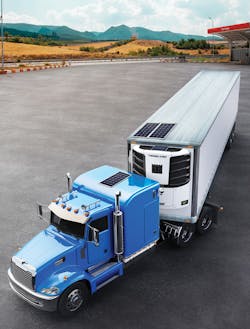Thermo King looks to expand use of electric, solar power
With the advancements of electric powertrains under the hood come new questions and opportunities involving the trailer.
“Ideally, customers have an electric refrigeration unit to go with their electric or hybrid vehicle. Thermo King’s goal is to be in a position to provide those capabilities when the time comes,” said Paul Kroes, power solutions business development manager for Thermo King.
The subsidiary of Ingersoll Rand Inc. continues to work with a variety of original equipment manufacturers to forge “new ground and relationships” and stay ahead of the technology adoption curve, Kroes said.
Much of the focus surrounds the best ways to share electric power with the tractor to ensure proper charging of the refrigeration unit so drivers do not have to stop during a delivery route.
One example of this work is the prototype electric refrigerated delivery van that Thermo King developed with Chanje. First shown at the Advanced Clean Transportation Expo in April, the V8100 produces zero emissions and can carry 4,000 lbs. about 120 miles before needing to be charged.
It is equipped with a Thermo King V-520 RT refrigeration unit and ThermoLite solar panels, designed to make last-mile delivery more efficient and sustainable.
Kroes called this project a “great experiment,” allowing the company to obtain useful data from a smaller delivery vehicle with minimal power needs. Developments like this prototype lead to an extension to larger applications in the future, said Kroes, adding the company is planning to unveil several product updates in the coming quarters.
The popularity of solar panels are likely to increase as more electric vehicles hit the road, especially in warmer states like Arizona.
But before that can happen, Kroes said Thermo King is studying the performance reliability of solar panels for vehicles that spend time in places like Seattle, where rain and cloudy days are much more common, as well as overall performance in the winter when the days are shorter, regardless of climate.
In addition, there are financial questions when debating investing $20,000 to outfit a tractor-trailer with solar panels, compared with $10,000 for additional electric batteries that are then charged overnight.
A report from the North American Council for Freight Efficiency (NACFE) recommended many carriers consider investing in solar systems because they are thin, flexible, and can be installed against the curve of a roof fairing.
“The roof fairing of the tractor has historically gone unused and has ideal access to sunlight,” NACFE said in the report released last year.
NACFE estimates solar panels mounted to the roof fairing of a tractor can produce enough power to extend the electric APU operation for potentially up to four hours.
Separately, Thermo King earlier this year displayed the second generation of its all-electric TriPac Envidia auxiliary power unit. It can offer drivers 10 hours of runtime
About the Author
Neil Abt
Neil Abt is a former FleetOwner editor who wrote for the publication from 2017 to 2020. He was editorial director from 2018 to 2020.
